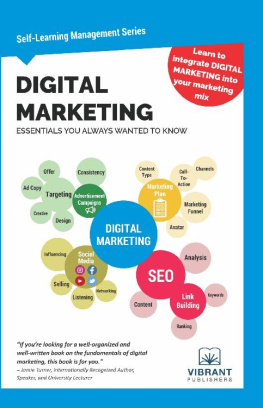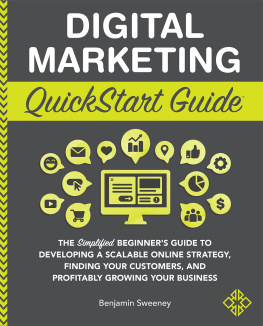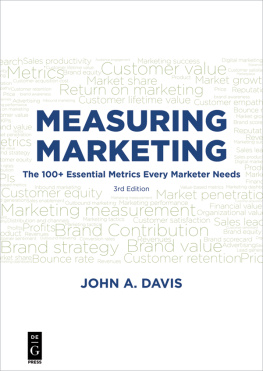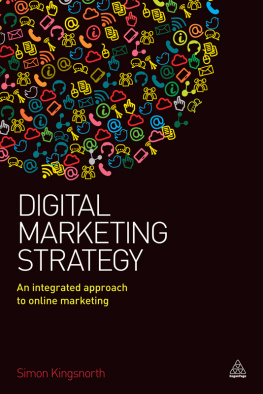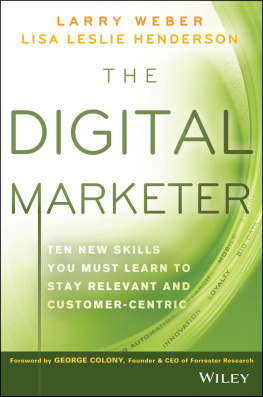Christopher Penn - Marketing White Belt: Basics For the Digital Marketer
Here you can read online Christopher Penn - Marketing White Belt: Basics For the Digital Marketer full text of the book (entire story) in english for free. Download pdf and epub, get meaning, cover and reviews about this ebook. year: 2011, genre: Business. Description of the work, (preface) as well as reviews are available. Best literature library LitArk.com created for fans of good reading and offers a wide selection of genres:
Romance novel
Science fiction
Adventure
Detective
Science
History
Home and family
Prose
Art
Politics
Computer
Non-fiction
Religion
Business
Children
Humor
Choose a favorite category and find really read worthwhile books. Enjoy immersion in the world of imagination, feel the emotions of the characters or learn something new for yourself, make an fascinating discovery.
- Book:Marketing White Belt: Basics For the Digital Marketer
- Author:
- Genre:
- Year:2011
- Rating:3 / 5
- Favourites:Add to favourites
- Your mark:
- 60
- 1
- 2
- 3
- 4
- 5
Marketing White Belt: Basics For the Digital Marketer: summary, description and annotation
We offer to read an annotation, description, summary or preface (depends on what the author of the book "Marketing White Belt: Basics For the Digital Marketer" wrote himself). If you haven't found the necessary information about the book — write in the comments, we will try to find it.
Marketing White Belt: Basics For the Digital Marketer — read online for free the complete book (whole text) full work
Below is the text of the book, divided by pages. System saving the place of the last page read, allows you to conveniently read the book "Marketing White Belt: Basics For the Digital Marketer" online for free, without having to search again every time where you left off. Put a bookmark, and you can go to the page where you finished reading at any time.
Font size:
Interval:
Bookmark:
Acknowledgements and Credits
Though many of the archetypes and concepts in this guide are timeless, they would never have been brought to my attention as concisely, clearly, and powerfully without the work of martial arts legend Stephen K. Hayes, nor taken from idle intellectual exercises into vibrant reality save for my teachers at the Boston Martial Arts Center and master teacher Mark Davis. To these folks I owe nearly two decades of thanks for repeatedly opening my eyes to the truth sitting in front of me, and more than occasionally smacking me upside the head to wake me up.
Learn more about Stephen K. Hayes at his website, StephenKHayes.com .
Learn more about Mark Davis and the Boston Martial Arts Center at his website, BostonMartialArts.com.
For those that find my writing to be as practical as it is big picture, you have Michelle Chel Wolverton and Bryce Moore to thank for that. Chel is my editor in chief, sounding board, and chief critic, ensuring that what Im saying makes at least some degree of sense before hitting the publish button. Bryce Moore is one of my favorite minds to bounce ideas off of, and without his input on many of the more complex theories weve chewed in late into the night, my marketing knowledge and skill would be significantly poorer.
Learn more about Chel at ChelConsulting.com.
Learn more about Bryce at ABiteofSanity.com.
Introduction
When you set foot on the floor of a well-run martial arts school, theres usually someone who can give you a brief tour, give you an idea of what you might learn, and perhaps get you started with an introductory class. As a white belt, as a beginner, your mind is totally open to new ideas, untainted by dogma or doctrine. During the course of your white belt training in a well-run school, you learn all of the basics and foundations of the new martial system. In subsequent belt and grade levels, youll dig into each of the topic areas and learn techniques in depth, but the goal of white belt training is to get you involved in the system and see the big picture.
Wouldnt it be nice if the world of marketing was the same as the world of martial arts? In marketing today, very often youre thrown into the job with little or no preparation, few tools, and no clear direction about what youre supposed to do except to market, whatever that means. In the digital marketing world, this problem is especially prevalent as many people find their way into marketing roles without any marketing training whatsoever. Entrepreneurs also find themselves in this very difficult situation quite frequently, starting from a one person show in a garage or home studio and suddenly needing to attract people to their creations.
This short guide, then, is your white belt course, your white belt overview to some marketing basics, looking at a collection of tools, ideas, frameworks, and methods, condensed down to the bare minimums that you need as a new marketer. This guide is not and does not pretend to be a comprehensive course in marketing - a local business school or community college can give you that level of depth if you truly need it. Nor is this guide a replacement for experience or deep study - take an MBA course for that.
What this guide is intended to be, however, is a primer on marketing for the person thrown (un)willingly into a marketing role or the entrepreneur not sure where to start in the world of marketing It does also serve as a handy refresher for many marketing professionals a few years out from their academic experiences, a reminder of the fundamentals. Approach it with the same feeling as a white belt - with an open mind and an open heart!
After you finish this guide, you should have a better idea of what youre supposed to be doing and a more clear sense of where you should be directing your next line of study.
Gambatte kudasai , as we say in the dojo. Good luck, and keep going!
How To Read This Book
This book is structured exactly like the kind of experience youd have at a martial arts dojo, where youll be introduced to some main concepts and ideas, followed by practical exercises to try for yourself. It is very much a white belt course in the sense that well look at the basics, but not delve deep into any one area. Well be focusing on four
elemental ideas from the Japanese martial art that Ive studied, translated into marketing. Each area of focus looks at a particular aspect of marketing and offers some insights into the basics of those areas.
Earth: Fundamentals, strategy, and command
From the idea of earth we look at the foundations and fundamentals, the solid ground on which we stand in order to make our marketing programs work.Water: Science, insight, metrics, and measurement
From the cool, calm, collected insights of water we look at understanding how to measure things, how to take a step back and see the big picture, and how to remove common misconceptions about marketing.Fire: Connection, relationship, creativity, content
From the passionate, intense heat of fire we examine the human aspects of marketing as well as understanding networks, relationships, and how things spread quickly like wildfire.Wind: Service, application, doing, making meaningful contributions
All of the planning and learning is for naught unless we actually do something with the knowledge, put it into action, and make it useful. From gentle breezes to fierce gales, we learn to put our plans into motion like the wind.The fifth element (besides being a wonderfully fun film by Luc Besson) is void , or the seamless, totally appropriate combination of ideas, tactics, and methods as needed and dictated by the situation. When you become proficient at marketing, you approach everything, every client, every challenge from the idea of an empty mind, no pre-conceptions or pre-drawn conclusions to mislead you or your clients, no assumptions that will damage your campaigns the moment they launch.
Chapter 1 : Fundamentals

Basic Business Models for Making Money
At the end of the day, you have to make money in order to pay the bills and stay in business . Theres no avoiding that reality: somewhere, resources must be provided in order for you to do what you do, whether youre a Little League baseball team or a Fortune 50 mega-brand.

In order to make money, you have to provide something in exchange. As marketers, its incumbent on us to understand how our businesses work so that we can understand where and how we provide value , then help share that value proposition with our customers.
While there are nearly limitless ways to provide value, most business strategies fall into four big categories:
- Product . You make something and sell it. This could be your bestselling social media book, clay pottery, aged cheese, whatever. It can be polished goods or raw commodities, but whatever it is, its a thing you sell. In exchange for the goods, you receive money. For most of human history, people made stuff and sold it, and their business fit into this category.
- Reseller . Someone else makes something and you buy it from them, then resell it. Youre not actually making anything, but chances are you package up the product or provide additional value-added services for it. For example, Walmart buys stuff from manufacturers and resells it to you. Their value-add is ubiquitous locations from which to buy stuff. Amazon does the same online.
- Service Provider . You do something for someone. Maybe youre a virtual assistant, a life coach, an email service provider , a stripper, a hotel, a stock broker, or an enterprise CRM in the cloud. You do something for someone, but dont make any tangible good that you can hand over. In exchange for the service you provide, you receive a fee.
Font size:
Interval:
Bookmark:
Similar books «Marketing White Belt: Basics For the Digital Marketer»
Look at similar books to Marketing White Belt: Basics For the Digital Marketer. We have selected literature similar in name and meaning in the hope of providing readers with more options to find new, interesting, not yet read works.
Discussion, reviews of the book Marketing White Belt: Basics For the Digital Marketer and just readers' own opinions. Leave your comments, write what you think about the work, its meaning or the main characters. Specify what exactly you liked and what you didn't like, and why you think so.



